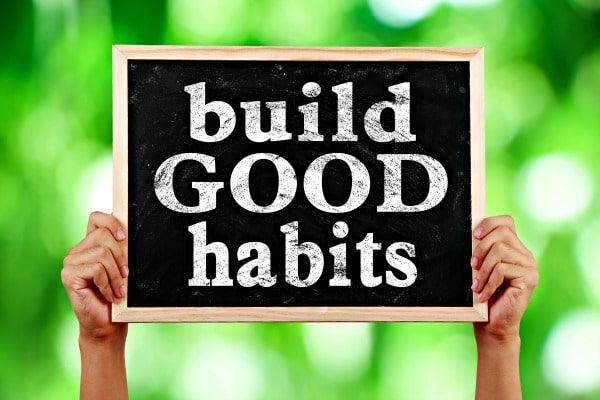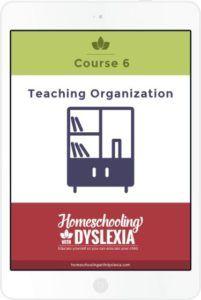Kids still in their pajamas at noon? Chores not finished? Schoolwork not getting completed? Transform your homeschool by changing your habits one at a time. Here’s how!

Kids still in their pajamas at noon? Chores not finished? Schoolwork not getting completed?
We’ve all been there, but wouldn’t it be wonderful if our kids got up in the morning and got dressed, completed their assignments, and did their chores? That would be some radical transformation!
While there is no magic bullet that will remove all those pesky, real-life obstacles that stand in the way of your family and a peaceful home, there is something that you can do each day that, over time, will result in a home that is substantially more peaceful and productive.

The Power of Habit
Studies show that 40-45% of everything we do each day is done out of habit. Habits are those things that we do with very little conscious thought – like driving for example, or for many of us homeschool moms, making the morning coffee.
The power of habit is that activities done out of habit require very little conscious effort or thought and therefore require less mental energy.
Thus, if we have a habit of going to the gym every Monday, Wednesday and Friday, when the alarm goes off on Monday morning we aren’t wondering if we should go to the gym, or where our gym clothes are or searching for any other excuse for not going to the gym. It’s Monday. It’s a gym day. Boom – done!
Think about that for a minute.
Imagine your children getting up in the morning, finishing their morning routines and hitting the books with little to no reminders from you. Looks nice, doesn’t it?
In my 20+ years of homeschooling, establishing good habits in your home will transform your school day.
Let’s take a look at how habits are established and some simple strategies for growing helpful habits in your home.

How to Habits Are Established
Habits are created simply by doing a task or activity consistently over time. While simple, this isn’t always easy.
Establishing habits is difficult at first – especially the first time a task is attempted.
I remember when I first set about to make a habit of going to the gym. I got up early, full of determination, but couldn’t find my gym clothes, ended up waking up the kids and struggling to get out the door.
With time and routine, I was able to get out the door more and more easily, and finally, after a short time, everyone knew I was going to the gym and a new habit was formed.
Small Wins and Momentum
Interestingly, once I had established a habit of going to the gym, I was more motivated to eat better. In fact, I began to grow in my confidence and began to focus on other areas of my life that were crying out for more discipline.
This happy chain of events is sometimes referred to as ‘small wins’. Once we begin to experience success in one area of life, our confidence builds and we have the inspiration to tackle other areas of our lives. Momentum builds as we build habit upon habit.
Having discipline in one area often results in growing discipline in other areas.
Habits at Home: 3 Steps
So how can we apply this idea of habit to our homes and homeschools?
1. Start small
Remember that habits build upon one another and are difficult to establish in the beginning. If we start small, with one habit, we won’t overwhelm our kids.
Pick one area in which to start building habits. Here’s a good place to start.
Teach your kids to make their beds!

This simple task has been linked to some amazing benefits.
Making your bed every morning is correlated with better productivity, a greater sense of well-being, and stronger skills at sticking with a budget. It’s not that… a tidy bed causes better grades or less frivolous spending. But somehow those initial shifts start chain reactions that help other good habits take hold. – Charles Duhigg, author of The Power of Habit
Making your bed has the added benefit of only taking about 2 minutes to accomplish and there is immediate positive feedback – a neater, tidier room.
The two-minute rule
Another simple habit to teach your kids was proposed by David Allen, author of Getting Things Done:
If it takes less than two minutes, do it now.
Think of all the things that can be accomplished in two minutes!
2. Positive feedback or rewards
It is important for a habit to form for there to be some kind of positive feedback or reward after the activity is completed.
My reward for going to the gym was looking better and having more energy. The reward for making your bed is a neat and at least somewhat orderly room.
Create a morning time habit
A morning table time is another great place to start establishing habits. Starting the day off with a well-established routine will help the rest of the day to go well, and if the day does go south, hey – you had a good morning right?
For me as a busy mom, I like to write down everything that is included in a morning routine or our morning table time.

This simple page contains a list of everything that I like to accomplish in our Morning Time. You can read more about our Morning Time here.
Over time, as the habit is formed, my kids know to get the supplies that they need and are ready to start without my prompting. The reward is getting a lot of school work accomplished in a short period of time in a relaxed and enjoyable way.
I have found that as long as Mom is organized, the kids eventually easily follow suit.
3. Be consistent
“We are what we repeatedly do. Excellence then, is not an act, but a habit.” – Aristotle
Have you ever heard that it takes 30 days to establish a habit? Studies actually show that habits are established in between two and eight months. Can you miss a day or two here and there? Absolutely! The key takeaway is that consistency over time is important in establishing a habit.
A List of Helpful Homeschool Habits
Productivity experts all agree that a good night sleep and exercise are the foundation of a productive day. These two daily habits can be established in your home by setting an example and creating a family routine of bedtimes and daily outdoor playtime.
Other helpful homeschool habits:
- morning mile – taking the kids for a 1 mile walk/run every morning
- morning routine – start small and add activities (I use lists) of things to be accomplished before school
- morning time – see this post for more info on this simple but powerful homeschool habit
- bible study or quiet time – usually in the morning after waking or evening before sleeping
- library day
- reading/listening time
- assigned reading
- chores
- evening routine
- playing outside everyday
- eat dinner together
How Healthy Habits Affect Kids as They Grow
Habits grow other habits. That’s why signing kids up for piano lessons or sports is so important. It has nothing to do with creating a good musician or athletes. When you experience the power of habit by practicing for an hour or running everyday, you start building self-regulatory strength. A five-year-old who can follow the ball for ten minutes becomes a sixth grader who can start his schoolwork on time.
If you’re still not convinced that establishing habits in your kids is worth the time and effort, think about this. Research has shown that self-discipline predicted academic performance more than did IQ. Self-discipline also predicted which students would improve their grades over the course of the school year, whereas IQ did not.… Self-discipline has a bigger effect on academic performance than does intellectual talent.
How about you? Which habits have been helpful in your home?

 If you have a child that needs help with organization, whether that is organizing their belongings, their time or their thoughts, take my parent course: Teaching Organization: Help for the Hopelessly Unorganized Child.
If you have a child that needs help with organization, whether that is organizing their belongings, their time or their thoughts, take my parent course: Teaching Organization: Help for the Hopelessly Unorganized Child.
In this class you will learn why it is so difficult for some kids to be organized, despite their desire to be organized. The course contains a wide variety of proven methods and techniques for establishing good habits in your home.






I loved this post! I am curious about one fact you stated. You said that 40-45% of everything we do is out of habit? Do you have a source for that? Maybe I just missed it?
I read it in the book, The Power of Habit by Charles Duhigg. 🙂
hi could u give me tips how to make a morning timetable routine wise for my 14 year old